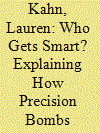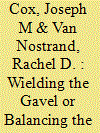|
|
|
Sort Order |
|
|
|
Items / Page
|
|
|
|
|
|
|
| Srl | Item |
| 1 |
ID:
188920


|
|
|
|
|
| Summary/Abstract |
Governments often use curfews as counterinsurgency measures. Do such state actions affect citizens’ political preferences? We argue that citizens’ responses depend on their group alignment. Citizens who are aligned with the government are more likely to interpret state actions as serving their interests and reward the governing parties as a result. Citizens who are aligned with the insurgent movement, however, are likely to interpret these same actions as targeted and disengage from politics: they have no reason to reward the governing parties and may also be fearful of expressing support for the parties affiliated with the insurgent movement. We find support for this argument with survey data from Turkey, fielded before and during curfews. When exposed to curfews, Turks generally increase their support for the governing party. However Kurds do not increase their support for the governing party or the opposition; instead, we present strong evidence that they withdraw their support from the Kurdish opposition and become more hesitant to express any political preferences.
|
|
|
|
|
|
|
|
|
|
|
|
|
|
|
|
| 2 |
ID:
188918


|
|
|
|
|
| Summary/Abstract |
How does domestic surveillance affect the frequency of political imprisonments in autocratic states? In contrast to conventional wisdom, I argue that surveillance reduces the frequency of political imprisonments in power-maximizing autocracies. Surveillance decreases uncertainty about the correct targets of repression, allowing for more selective detentions and shifts to silent instruments of repression. To investigate these claims, I draw on a unique county-level dataset of political imprisonment in the German Democratic Republic between 1984 and 1988. I proxy the number of monitored individuals with newly collected county-level data on surveillance operations. I use ordinary least squares (OLS) regression, random effects, and instrumental variable models to investigate the impact of surveillance on political imprisonment. I find that higher shares of spies per monitored individual were associated with a reduction of political imprisonment. Further, increasing levels of spy infiltration were linked to a systematic shift to silent instruments of repression.
|
|
|
|
|
|
|
|
|
|
|
|
|
|
|
|
| 3 |
ID:
188922


|
|
|
|
|
| Summary/Abstract |
This article introduces the Peace Negotiations in Civil Conflicts (PNCC) dataset, which identifies whether a state-party and rival non-state armed group is in the formal negotiation phase of a peace process. The PNCC goes beyond recording instances of peace talks by offering a conceptual framework to identify when a government-rebel group dyad is at risk of formal negotiations. It explicitly considers issues central in event-history modelling, including censoring and the observation period. The PNCC also provides detailed information on negotiations, including the date and location of peace talks, and whether negotiations were bilateral or through mediation. The PNCC is the first source to distinguish mediated and non-mediated civil conflict negotiations under a single framework. Structured over the UCDP/PRIO Armed Conflict Dataset with global coverage for 1975-2013, the PNCC is integrable to commonly used civil war datasets.
|
|
|
|
|
|
|
|
|
|
|
|
|
|
|
|
| 4 |
ID:
188919


|
|
|
|
|
| Summary/Abstract |
In Afghanistan, Libya, Liberia and beyond, armed rebellions have begun when armies fell apart. When does this occur? This paper conducts a large-N analysis of these army-splinter rebellions, distinct from both non-military rebellions from below and from coups, using new data. It finds that they follow a logic of state breakdown focusing on regime characteristics (personalist regimes and the loss of superpower support at the end of the Cold War) rather than drivers of mass mobilization from below. In contrast, these regime-level factors matter much less for the non-military rebellions from below that dominate theorizing about civil war origins. This paper also shows that one option for military rebels lies in not attempting a coup but instead heading straight into a rebellion. This paper thus distinguishes highly different paths to armed conflict, validates the state breakdown approach to why armies fall apart, and extends the well-known tradeoff between coups and civil wars.
|
|
|
|
|
|
|
|
|
|
|
|
|
|
|
|
| 5 |
ID:
188917


|
|
|
|
|
| Summary/Abstract |
Smart weapons represent a key element of military power for countries around the world, and nothing symbolizes them more than smart bombs—the guided aerial bombs that the United States debuted in the Vietnam War. Yet, international relations scholars know little about these weapons and what explains their proliferation. In this paper, we theorize about the key drivers of smart bomb proliferation, including an interaction between the security environment, regime type, and the interest of states in precision to help them follow the law of war. We then introduce a new dataset on smart bombs from 1960-2017. The results show that internal and external security threats make countries more likely to acquire smart bombs. These effects interact with regime type and whether countries are more likely to ratify treaties related to the law of war. GDP per capita and economic capacity also appears fundamental to explaining smart bomb adoption.
|
|
|
|
|
|
|
|
|
|
|
|
|
|
|
|
| 6 |
ID:
188921


|
|
|
|
|
| Summary/Abstract |
This study analyzes the institutional variation across domestic legal systems, with a focus on common law system’s adherence to precedent and reduced recourse to judicial deference, as well as on the degree of independence afforded to courts. These institutional qualities of judiciaries provide the opportunity for courts to play a more active role in the implementation of post-conflict justice, increasing uncertainty for other policymakers concerning the ultimate contours of post-conflict justice processes. To reduce such uncertainty, policymakers ensconced in these types of institutional contexts will be less likely to implement post-conflict justice. Using data from the Post-Conflict Justice dataset, we find that states with common law systems are less likely to pursue and implement post-conflict justice compared to states with civil or Islamic law systems. Moreover, independent courts will be less likely to pursue mixed or restorative forms post-conflict justice, though the impact of judicial independence is weak overall.
|
|
|
|
|
|
|
|
|
|
|
|
|
|
|
|
|
|
|
|
|